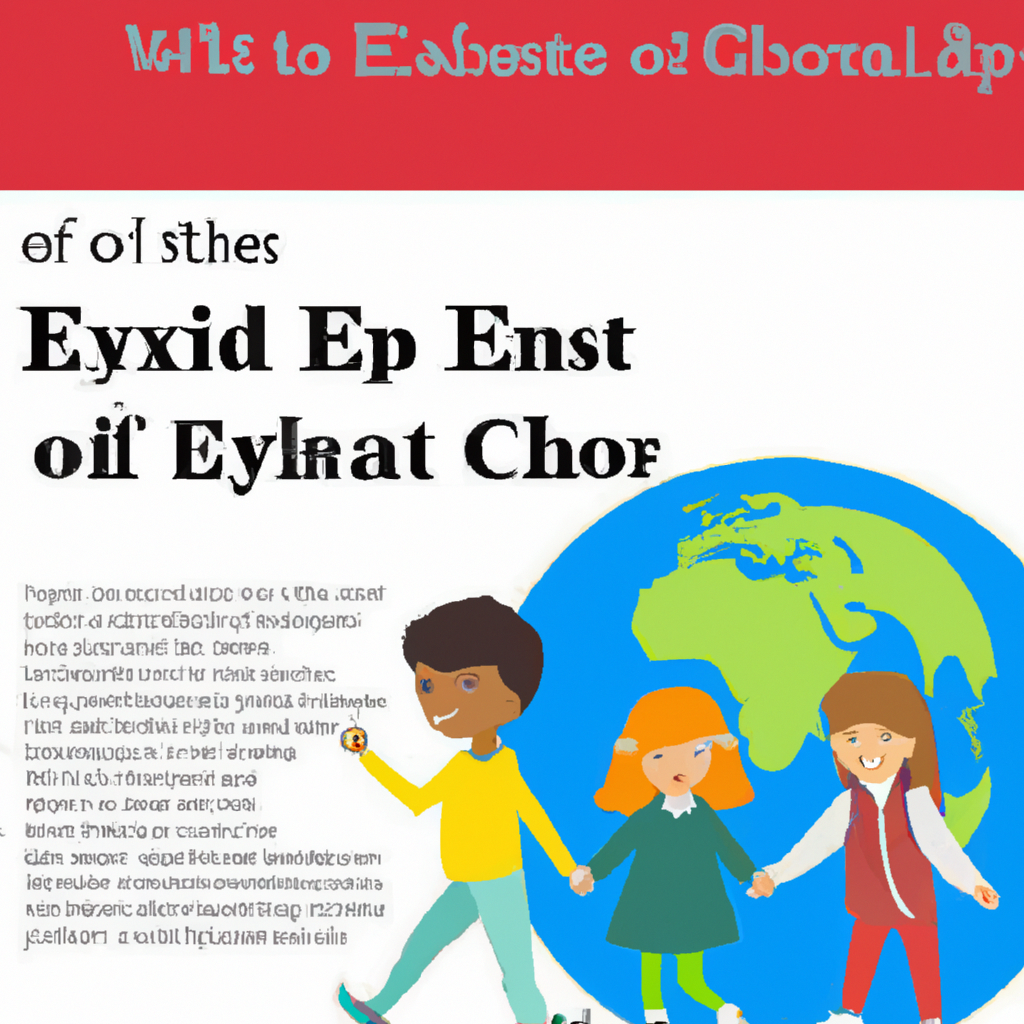Are you an expat living in the UK with children? If so, understanding the UK education system is crucial to ensuring a smooth transition for your little ones. In this article, we will explore the ins and outs of the UK education system for expat children, providing you with valuable insights and information to help navigate this new educational landscape with ease. From primary schools to secondary schools, curriculum differences to enrollment processes, we’ve got you covered. So, let’s dive in and unlock the secrets of the UK education system for your expat children!
Overview of the UK Education System
The UK education system is known for its high quality and comprehensive approach, providing a solid foundation for children’s academic and personal development. Understanding how the system works is crucial for expat families who are considering moving to the UK. Here, we provide a comprehensive overview of the UK education system to help you navigate through the various stages and make informed decisions about your child’s education.
Compulsory Education
In the UK, education is compulsory for all children between the ages of 5 and 16. This means that every child must attend school or receive an appropriate form of education during this period. Parents have the option to choose between state schools, independent schools, or international schools.
School Structure
The school structure in the UK is divided into four main stages: primary education, secondary education, further education, and higher education. Primary education consists of two key stages: Key Stage 1 (ages 5-7) and Key Stage 2 (ages 7-11). Secondary education covers Key Stage 3 (ages 11-14), Key Stage 4 (ages 14-16), and further education includes Key Stage 5 (ages 16-18).
Key Stages
Each key stage within the UK education system has specific learning objectives and curriculum requirements. Key Stage 1 focuses on building a strong foundation in core subjects such as English, mathematics, and science. Key Stage 2 builds on these foundations and introduces additional subjects such as history, geography, and foreign languages. Key Stage 3 and 4 provide a more comprehensive curriculum, preparing students for the General Certificate of Secondary Education (GCSE) examinations.
Curriculum
The UK education system follows a national curriculum that sets the standards for what children should be taught at each key stage. The national curriculum covers a wide range of subjects, including English, mathematics, science, history, geography, art, music, physical education, and modern foreign languages. The curriculum is designed to provide a well-rounded education and develop students’ knowledge, skills, and understanding in various areas.
Entry Requirements for Expat Children
Moving to a new country can be challenging, especially when it comes to enrolling your child in a new school. Understanding the entry requirements for expat children in the UK is essential to ensure a smooth transition and avoid any unnecessary complications.
Visas and Residency
Before enrolling your child in a UK school, you must ensure that you have the necessary visas and residency status. Expats typically need a visa to live and work in the UK, and this may affect your child’s eligibility to attend certain schools. It is crucial to research the visa requirements and seek advice from relevant authorities to ensure compliance.
Age Requirements
Age requirements for school entry vary depending on the child’s birth date and the academic year in the UK. Generally, children start primary school in the academic year in which they turn five. However, some children may be eligible to start school at the age of four if their birthday falls before a certain cut-off date. It is important to check the specific age requirements with the schools you are considering.
Transfer Process
The transfer process for expat children will depend on various factors, such as the child’s age, previous educational background, and the availability of school places. If your child is transferring from another country, it is recommended to contact potential schools well in advance to discuss the transfer process and any necessary documentation. Some schools may require evidence of previous academic achievements or assessments to determine the appropriate year group placement.

Choosing the Right School
Choosing the right school for your child is essential to ensure their educational and personal development. In the UK, there are various types of schools to choose from, each offering different educational philosophies, facilities, and support systems.
State Schools
State schools, also known as public schools, are funded and regulated by the government. These schools follow the national curriculum and are open to all children who meet the age requirements and reside within the school’s catchment area. State schools can offer a high-quality education and generally do not charge tuition fees.
Independent Schools
Independent schools, also known as private schools, are privately funded and not regulated by the government. These schools often have more flexibility in their curriculum and teaching methods. Independent schools may have selective admission processes and charge tuition fees. They are known for their strong academic focus, smaller class sizes, and extensive extracurricular opportunities.
International Schools
International schools offer a curriculum that is different from the national curricula of the host country. These schools cater to a diverse community of expat families and provide an education that follows a different educational philosophy or curriculum, such as the International Baccalaureate (IB) or the American curriculum. International schools offer a smooth transition for expat children by providing an environment that supports cultural diversity and global perspectives.
Understanding Key Terms
When navigating the UK education system, it is important to understand key terms and concepts that are commonly used. Here, we provide an explanation of some of the most frequently used terms in the UK education system.
Ofsted Reports
Ofsted stands for the Office for Standards in Education, Children’s Services and Skills. Ofsted is the government body responsible for inspecting and regulating schools in England. Ofsted reports provide independent evaluations of school performance, including assessments of teaching quality, student attainment, and overall school effectiveness. These reports can help parents make informed decisions about school choices.
GCSEs and A-Levels
GCSEs (General Certificate of Secondary Education) and A-Levels (Advanced Level) are two types of examinations that students in the UK typically take during their secondary education. GCSEs are usually taken at the end of Key Stage 4 (ages 14-16) and provide a measure of a student’s academic achievements across different subjects. A-Levels are more focused and are typically taken by students in Key Stage 5 (ages 16-18) as a pathway to higher education.
Further Education
Further education refers to education that takes place after secondary education, usually during the ages of 16 to 18. Further education can include a range of options, such as sixth form colleges, vocational training, apprenticeships, or other specialized educational programs. It is a continuation of education that prepares students for higher education or the workforce.

Support for Expat Students
Expat students may face unique challenges when transitioning into the UK education system. However, there are various forms of support available to help them succeed academically, linguistically, and socially.
English as a Second Language (ESL) Support
For expat students who are non-native English speakers, English as a Second Language (ESL) support is crucial to facilitate their language development and integration into the curriculum. Many schools offer dedicated ESL classes or provide additional language support within mainstream classrooms to help expat students reach their full potential academically and linguistically.
Special Educational Needs (SEN) Support
Some expat students may have special educational needs that require additional support. The UK education system aims to be inclusive and provides various types of support for students with special educational needs (SEN). This can include individualized education plans, specialized teaching methods, and support from learning support assistants or other professionals.
Cultural Integration
Expat students may also benefit from cultural integration programs and initiatives that help them adjust to the new environment. Schools often promote cultural awareness, organize multicultural events, and encourage students to learn about different cultures. These initiatives foster a sense of belonging, promote understanding, and help expat students build new relationships and adapt to their new surroundings.
School Year and Holidays
Understanding the school year and holiday schedule is crucial for expat families to plan their vacations, trips, and other activities. The UK school year is divided into three terms, each with its own term dates, half-term breaks, and holiday schedule.
Term Dates
The school year in the UK typically starts in early September and ends in mid-July. Each term is approximately 12 to 14 weeks long, with specific term dates set by the respective school. It is important to check the term dates with your child’s school to ensure you are aware of when the term begins and ends.
Half-Term Breaks
Half-term breaks occur midway through each term and provide students with a short break from school. These breaks usually last for one week, giving students an opportunity to rest, recharge, and spend time with their families. Half-term breaks are a good time for expat families to plan vacations or engage in other activities.
Holiday Schedule
The holiday schedule in the UK includes both national holidays and school holidays. National holidays, such as Christmas Day and New Year’s Day, are designated public holidays and are observed across the country. School holidays, on the other hand, usually coincide with half-term breaks and longer breaks, such as the summer holiday. It is important to consult your child’s school for the specific dates of school holidays.

Extracurricular Activities and Clubs
Extracurricular activities and clubs play a vital role in a child’s holistic development, providing opportunities for them to pursue their passions, develop new skills, and build friendships. The UK education system offers a wide range of extracurricular activities and clubs to cater to diverse interests and talents.
Sports
Sports are an integral part of the UK education system, promoting physical fitness, teamwork, and sportsmanship. Schools often offer a variety of sports clubs, teams, and facilities, enabling students to participate in activities like football, rugby, cricket, tennis, swimming, and athletics. In addition to school-based sports, there are also opportunities for students to compete in inter-school competitions and regional sports events.
Music and Arts
Music and arts play a significant role in the UK education system, encouraging creativity, self-expression, and cultural appreciation. Schools offer music lessons, choirs, bands, orchestras, and drama clubs, providing students with opportunities to learn to play musical instruments, sing, act, and participate in theatrical performances. Many schools also organize art exhibitions and showcase students’ artworks, fostering a vibrant arts community.
Debate and Academic Clubs
Debate and academic clubs are popular extracurricular activities that promote critical thinking, communication skills, and intellectual growth. These clubs provide platforms for students to engage in debates, public speaking, model United Nations simulations, and various academic competitions. Participating in such clubs not only enhances students’ academic abilities but also nurtures important life skills that will benefit them in their future endeavors.
Assessment and Grading
Assessment and grading are an integral part of the UK education system, providing feedback on students’ progress and performance. Understanding the assessment methods and grading system will help expat families monitor their child’s academic achievements and support their educational journey.
Exam Boards
Exam boards in the UK are responsible for setting and administering examinations at the end of key stages or courses. There are several different exam boards, such as AQA, Pearson Edexcel, and OCR, each providing assessments for different subjects and qualifications. Schools usually determine which exam board to follow based on their curriculum and desired qualifications.
Grading System
The grading system in the UK education system varies depending on the qualification or assessment. GCSEs and A-Levels, for example, are graded on a numerical scale from 9 to 1, with 9 being the highest grade and 1 being the lowest. Other qualifications may use different grading systems, such as alphabetic or descriptive indicators. It is important to familiarize yourself with the specific grading system used by your child’s school or exam board.
Standardized Tests
Standardized tests, such as GCSEs and A-Levels, are national assessments that measure students’ knowledge, understanding, and skills in various subjects. These tests are externally marked and provide an objective measure of student achievement. The results of these standardized tests often play a crucial role in university admissions or further education opportunities.

University and Higher Education
The UK is renowned for its prestigious universities and higher education institutions, attracting students from around the world. Understanding the university application process, tuition fees, and available financial support is essential for expat students planning to pursue higher education in the UK.
UCAS Application Process
The UCAS (Universities and Colleges Admissions Service) application process is used for undergraduate admissions in the UK. Students are required to complete an online application form, including personal details, qualifications, personal statements, and their choice of up to five university courses. The UCAS application process has specific deadlines, and it is important to plan and prepare well in advance to meet these deadlines.
Tuition Fees and Financial Support
Tuition fees for higher education in the UK vary depending on the university, course, and student status (home, EU, or international). International students often pay higher tuition fees compared to home or EU students. However, there are various financial support options available, such as scholarships, grants, and student loans, to help alleviate the financial burden. It is advisable to research and explore these opportunities to determine the best options for you.
University Rankings
The UK is home to many prestigious universities that consistently rank highly in global university rankings. University rankings consider various factors, including academic reputation, research output, student satisfaction, and employability. It is important to consider rankings as one of many factors when choosing a university, as personal fit and individual course requirements are also important considerations.
Challenges and Benefits of UK Education
While the UK education system offers numerous benefits for expat children, there can also be challenges that need to be navigated. Understanding these challenges and benefits will help expat families make informed decisions about their child’s education in the UK.
Language Barrier
One of the main challenges expat students may face when entering the UK education system is the language barrier. Non-native English speakers may require additional support to fully participate in classroom activities and academic assessments. However, the immersive English environment can also be an excellent opportunity for language acquisition and improvement.
Cultural Adjustment
Moving to a new country can be a significant adjustment for expat children, particularly in terms of cultural differences and social norms. However, the UK education system is known for its multicultural environment and inclusive practices, which can facilitate cultural integration and provide opportunities for cross-cultural friendships.
High-Quality Education
One of the greatest benefits of the UK education system is its high standard of education. The system emphasizes academic rigor, critical thinking, and independent learning, providing students with a strong foundation for higher education and future career success. The focus on holistic development also ensures that students have opportunities to explore their interests, pursue extracurricular activities, and develop important life skills.
In conclusion, the UK education system offers a comprehensive and high-quality education for expat children. Understanding the compulsory education requirements, school structure, key stages, and curriculum is essential for navigating the system effectively. Additionally, being aware of the entry requirements, choosing the right school, and utilizing the support available for expat students will ensure a smooth transition and successful educational experience. With its diverse range of extracurricular activities, assessment and grading methods, and opportunities for higher education, the UK education system provides a solid foundation for expat children’s academic and personal development.

